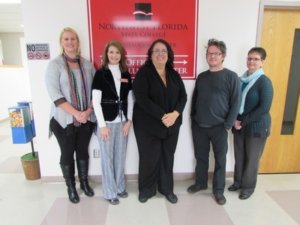
By BRUCE COLLIER
In the effort to avoid recidivism and prepare people released from incarceration to find a productive place in society, a program at the Walton County Jail has been especially successful.
Northwest Florida State College (NWFSC) currently has three Adult Education/GED classes held at the Walton County Jail. There are two classes for males, and one for females. In 2015, approximately 150 students were enrolled. There are two instructors, Sean Tabor and Tiffany Shaw, one tutor, Carla Vivrette, staff assistant Cheryl Hall, and Transition Advisor Stephanie Bailey. Also involved are inmates from Escambia County Jail, who are currently being housed in Walton County due to overcrowding at the Escambia facility.
The college and the Walton County Sheriff’s Office (WCSO) have an agreement for Corrections Literacy Education. The agreement provides Adult Basic Education as well as GED preparation (ABE/GED). There are also transitional services which include career development, transition to employment, and to higher education. Inmates can request to enroll, and are referred to the program by Walton County Jail Program Manager Andy Watkins.
The program is funded by a Corrections Literacy Grant written by Julie Terrell, Director of Northwest Florida State College Chautauqua Center & Adult General Education, in coordination with Andy Watkins.
The program’s foundational goal is for students to take and pass the GED exam. NWFSC’s Mobile Unit administers the tests at the jail. The exam tests four “modules” – language arts, math, social studies and science. Modules can be taken (and passed) separately. According to Bailey, “last semester (fall semester) 24 out of 25 GED modules taken were passed. This semester (spring 2016) started Jan. 11 and we have already had one student graduate on Jan. 20.”
The Herald sat in on a portion of a class. Instructor Sean Tabor taught a small group of female inmates about math, specifically the concept of negative and positive numbers. He handed out folders, paper, pens and textbooks. Prior to the beginning of the lesson, several of the inmate students went to another room to take tests. “Make me look good,” said Tabor with a smile.
The small size of the class allowed Tabor to address students’ individual concerns. As the class opened, one student frankly told Tabor she did not understand the concept of adding and subtracting negative numbers. Using the board, Tabor wrote out a series of problems and a number line and took the student through each problem until she began to understand. As they worked together, the other students wrote in their notebooks or studied the lessons.
Tabor said that the inmates have to reach back to their school days and retrieve their “academic memory,” enabling them to become students once again. Students will learn at different paces, he said, and their reading strength is generally a good indicator of their rate of learning speed. Bailey commented that the inmates can be very focused, and sometimes competitive with each other in achieving their goals.
The ABE/GED program is continuous, and attempts to address student inmates’ individual “gaps” in education. “We fill them in,” said Tabor.
Walton County Sheriff Mike Adkinson, the prime motivator and facilitator of the ABE/GED program, said “we have to remember that these people will get out and return to our community. An education greatly increases their chances of improving their quality of life. This helps their ability to be gainfully employed or simply be a better person ….. The truth is that it is the right thing to do.”
